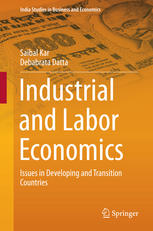

Most ebook files are in PDF format, so you can easily read them using various software such as Foxit Reader or directly on the Google Chrome browser.
Some ebook files are released by publishers in other formats such as .awz, .mobi, .epub, .fb2, etc. You may need to install specific software to read these formats on mobile/PC, such as Calibre.
Please read the tutorial at this link: https://ebookbell.com/faq
We offer FREE conversion to the popular formats you request; however, this may take some time. Therefore, right after payment, please email us, and we will try to provide the service as quickly as possible.
For some exceptional file formats or broken links (if any), please refrain from opening any disputes. Instead, email us first, and we will try to assist within a maximum of 6 hours.
EbookBell Team

4.4
42 reviewsThis book is an attempt to capture and analyze several idiosyncratic features of industry and labor in the developing world. Available books and graduate-level texts in labor economics largely discuss industrial and labor market situations prevalent in developed countries, where well-defined institutional arrangements and regulations create a very different scope of analysis. The patterns of choice in training and contracts in the labor market more apparent in developing and transition countries are discussed, as are the information-theoretic results. The book also critically examines labor migration, a context in which the developing and transition countries represent large sources in the present global order. A broad base of empirical observations from industries is used to develop analytical conjectures on risk-sharing arrangements between workers and employers, while strong intuitive explanations are combined with relevant mathematical and graphical derivations, ensuring the book’s readability among graduate students pursuing courses in labor economics and industrial economics for developing and transition countries. The book may also serve as a valuable reference guide for all students in advanced human resources courses at management schools. Presenting state-of-the art research findings in all of its chapters, the book discusses numerous institutional peculiarities of the developing world, making the results distinct in view of the general scope of labor economics.